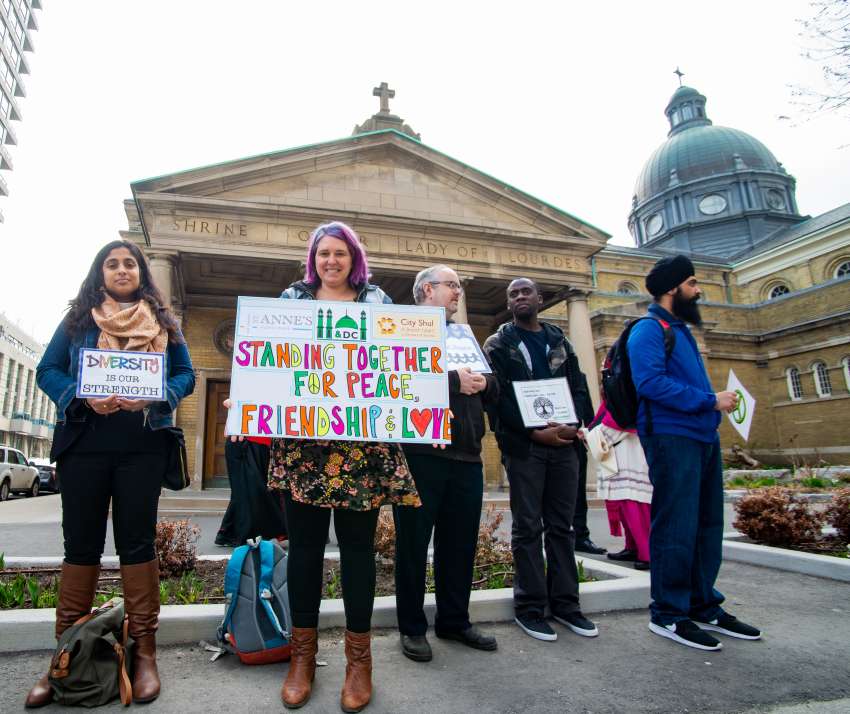The Toronto interfaith demonstration of solidarity with Tamil Catholics on April 26 was echoed nationally by a joint statement from the Canadian Council of Imams and the Canadian Conference of Catholic Bishops.
“This kind of thing has been going on for some time and it’s just terrible evil,” said Cardinal Thomas Collins, who attended the event before going on to celebrate Mass with the Tamil Catholic community of Our Lady of Good Health Parish at Immaculate Heart of Mary Church in Scarborough.
This was the first time the interfaith “Ring of Peace” movement came to a Catholic Church. The idea originated after the Quebec City mosque shooting of 2017 and until now the solidarity gatherings of Christians, Muslims, Jews and others have generally sprung up around Canadian mosques, most recently following the shooting rampage at a mosque in Christchurch, New Zealand in March.
“We have to stop meeting like this,” said Imam Muneeb Nasir, co-chair of the National Muslim-Christian Liaison Committee, as he stood outside Our Lady of Lourdes, home to the downtown Tamil Catholic community.
The interfaith nature of Ring of Peace demonstrations is critical, Nasser said.
“It’s important that religious communities respond together, rather than singly,” he said. “All of our communities have been affected by extremist voices. The vast majority of religious believers do not adhere to them.”
In a statement released jointly by Canada’s bishops and the council representing Canada’s imams, the religious leaders declared they were “rejecting all forms of hatred, violence and discord.”
“Both our religious traditions speak of peace, love and justice for all humanity,” they said. “It is abhorrent to see the people of Sri Lanka, whether gathered to worship on the feast of Easter or with family and friends in hotels, subjected to acts of hate and complete disregard for human life. As faith communities in Canada, we stand together.”
In another statement on the Easter bombings, the Council of Imams emphasized how terrorism and violence violate basic principles of Muslim faith.
“According to Qur’anic teachings, all religious places are sanctuaries,” they said. “It is abhorrent that this peace is disrupted, sanctity is violated, and lives are shattered by terrorists who belong to no religion nor subscribe to any moral ideals.”
Anglican priest Roshni Jayawardena, who is a mixed Singhalese and Tamil Sri Lankan, came to the demonstration carrying her memories of visits to the country.
“My family and so many are affected by this,” she told The Catholic Register.
The demonstration of solidarity in the Ring of Peace is a natural response to “a time of sadness,” said Jayawardena.
“It’s moments like this when we can live our faith,” she said.
Retired interfaith minister Jim Houston used to work on behalf of nine churches and five denominations among the immigrants who live across the street from Our Lady of Lourdes in St. James Town. Working in the high-rise neighbourhood, he became friends with dozens of Sri Lankan families.
“We’re all Sri Lankan today,” he said. “We’re here showing solidarity with the Sri Lankan community.”
“It’s always good when people of different faiths express their opposition to violence,” Cardinal Collins said.
As a pastor and religious leader, Collins has found himself standing with Coptic Christians following the 2015 ISIS beheadings of 21 Coptic migrant workers in Libya, with Armenian Christians commemorating the 100th anniversary of the 1914 to 1923 genocide in Turkey, expressing his dismay at the ethnic cleansing of Rohingya Muslims in Myanmar and observing the treatment of Uighur Muslims interred in re-education camps in China.
“By far the group on the Earth that is most persecuted, by far, is Christians,” he observed.
Canadian Conference of Catholic Bishops president Bishop Lionel Gendron sent a message of condolence to Sri Lankan bishops’ conference president Bishop Julian Winston Sebastian Fernando.
“It was devastating to receive the information of the tragedy on Easter Sunday, when Christians around the world were joined celebrating the Risen Lord and the beauty of the Paschal Mystery,” Gendron wrote. “We mourn the wanton acts of violence that targeted worshippers, families and visitors, sowing seeds of hate and division in a place of peace and unity which each society should foster and protect.”
He assured Fernando of Canada’s prayers.
“May you find comfort in the consolation and compassion of Our Lord, as well as through the prayers and support offered by your brothers and sisters in Christ from Canada and around the world,” he said.
In their statement the Canadian Council of Imams also emphasized prayer.
“CCI prays that God Almighty envelop those who lost their lives with His mercy and compassion. May He grant relief to the injured and ease the pain of all those who have been impacted,” the imams wrote.


